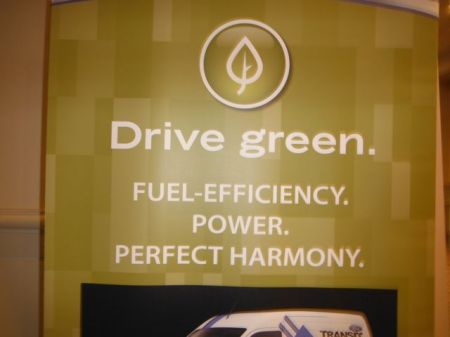At the show, I noticed that direct injection, continuously variable transmissions (CVT), and turbo-charging tended to appear in many manufacturers’ “eco” engines. Direct injection improves how the fuel gets into the pistons, making them more efficient. In laymen’s terms (my level) the CVT essentially creates more gears in an automatic transmission. This results in a more efficient use of the transmission at any given speed.
Numerous manufacturers are reporting good results from their newer engines. In Europe, for example Volvo’s T4 engine has delivered 35-45 mpg (city/highway) PLUS excellent torque with ample horsepower. Equally importantly in many people’s eyes, the T4 goes from 0 to 60 mph in about 6 seconds. This is an example of the fact that for many people, mpg is very important, but other factors (such as power) are pretty important also. Volvo is so pleased with the T4 engine that it plans to standardize its entire fleet with the T4 by 2015 as well as introduce the T45 engine to the US.
In terms of standardization, both Ford and Chevrolet are coming close to standardizing their “eco” engines across certain models. Ford has announced that it plans to produce 1.5 million cars with its “Ecoboost” technology in 2013 (I assume worldwide). Within a couple of years, 98% of Ford’s (car) models will have the CVT technology. For its part, Chevrolet uses an Ecotech engine with similar CVT and direct injection features on its Malibu and, more interestingly, as an option on some Silverado trucks. The Silverados even have a “fuel management” feature, which automatically switches the engine from a V6 (or V8) to a V4 cylinder in terms of fuel usage. Additionally, both the Malibu and the Silverado have become lighter in recent years.I am particularly impressed with Mazda’s Skyactiv engine system. It includes the direct injection and CVT components, but it also includes a piston redesign and very high compression ratios (13:1). The piston are now dome capped, vs. flat-capped before. This allows more airflow per piston cycle. They also substituted hi-tensile (lighter) steel for the heavier steel. This helps with weight reduction and reduces internal friction as well.
I like hybrids, and think electric cars are wonderful. The market for them is certainly growing. However, many millions of people will continue to buy cars with gas engines into the foreseeable future. I’m all for anything the manufacturers can do to improve the miles per gallon performance of the basic gasoline engine. The bottom line is that the car is using less fuel. I am very curious to see what will be available when I have to buy my next car.

